Have trouble sleeping? If you listen to music, white noise, ASMR, or relaxing, soothing voices as you go to bed, you’ll lower your heart rate and ease your mind, which helps you sleep better. But before you whip out your favorite tunes or podcast, you need to find which headphones are the right fit!
With headphones designed for sleep, you can help block out noises that keep you from sleeping while still being able to lie down in your favorite position. And best of all, these sleep headphones are safe to wear while sleeping, so long as the earpieces are comfortable and don’t disrupt your sleep.
Sleeping with your regular headphones is possible, but you need to find the right ones that’ll still feel comfortable as you sleep. But don’t worry; we’ll help you go through what that looks like!
Headphone Considerations
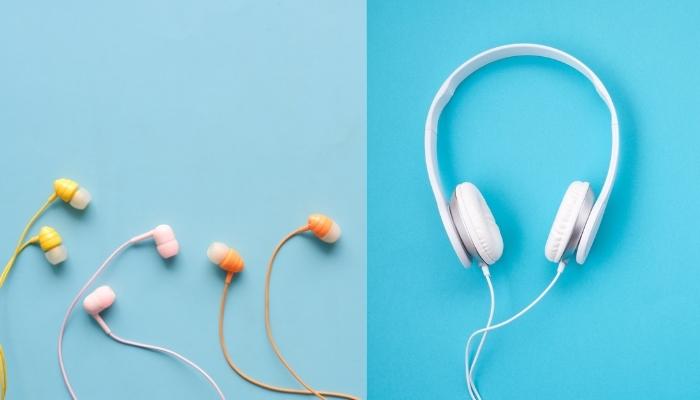
Before we dive into which type of headphones are best for sleeping, you need to keep a few considerations in mind, including the build and the sound:
- Durability: Headphones need to withstand compression from laying on a pillow and rolling around; look for ones specifically designed for sleeping.
- Flexibility: Headphones use flexible materials like silicone that adapt to your ears and minimize discomfort (no hard plastic!).
- Sound: Neutral, balanced headphones with low impedance or toned down high notes with warm presentation are best for sleeping.
- Weight: Lightweight headphones provide better comfort as you sleep.
- Wires: Wireless headphones prevent strangulation and make getting in and out of bed easier.
- Noise-Canceling: NC headphones are beneficial if sleeping with a partner who snores or if you live in a place with excess noise (but these will cost more)
Don’t forget to look for sleep or sound apps with guided meditations or different color noises to find the best sound type that helps you sleep deeper.
Sleeping Position
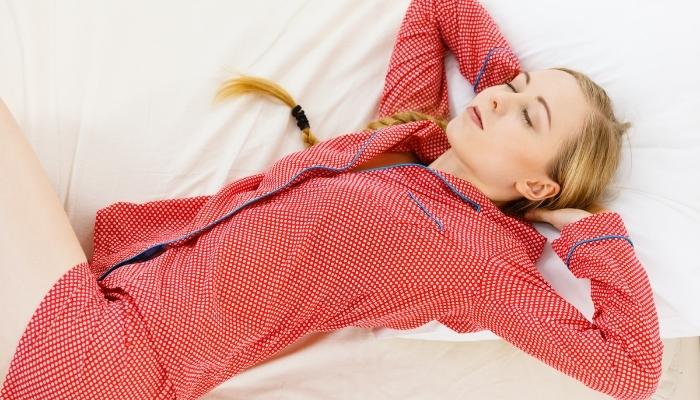
Certain types of headphones won’t feel comfortable depending on how you sleep, so you should always keep your sleeping position in mind.
For instance, back and stomach sleepers can use almost any headphone style, but side sleepers need to take care. If you sleep on your side, you need headphones with a low-profile design so that they don’t compress your ears too much while you sleep.
But if you’re a single sleeper, you can get away with a voice-assisted smart speaker, white noise machine, or speakers specifically designed for sleep.
Headband Headphones
Did you know that there are headphones that look like headbands? These headphones go around your head just like a headband, but they cover your ears for a comfortable sleep experience. Most headband headphones are wireless, charge quickly, and feature controls on the sides, but some models come with cables.
One thing that makes these headphones unique for sleep is that the speaker diaphragms are incredibly thin and flexible so that they conform to your ears — which is ideal for side sleepers. And best of all, the design makes it so you’re less likely to dislodge your headphones as you sleep.
You can also find eye mask headphones that go over your eyes and ears, with front controls.
Earbuds
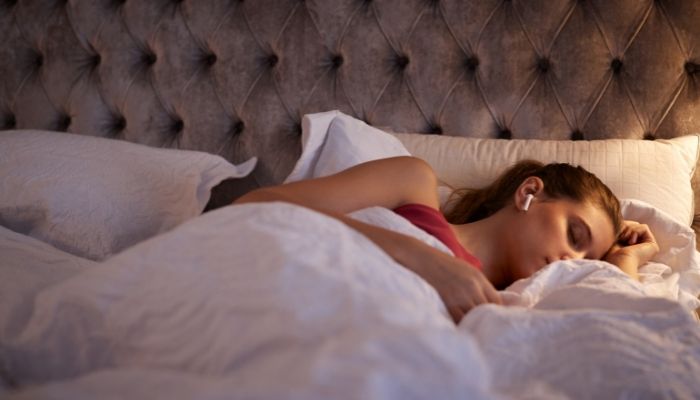
If you sleep on your back, sleep earbuds are the answer. Earbuds designed for sleep have a super small and unobtrusive design and tend to work more like earplugs to block out sound. But the great thing about sleep earbuds is that you can find ones that also work for the daytime and take with you on the go, especially those that are completely wireless.
Other earbud models have pre-loaded sleep sounds or pink noise on accompanying apps to work as your personal white noise machine. You can even find earbuds that don’t play any music and completely block out noise like souped-up earplugs!
Pro Tip: To ease discomfort from wearing earbuds as you sleep, try using a pillow with a hole in the middle (used initially for people recovering from ear surgery).
Over-the-Ear Headphones
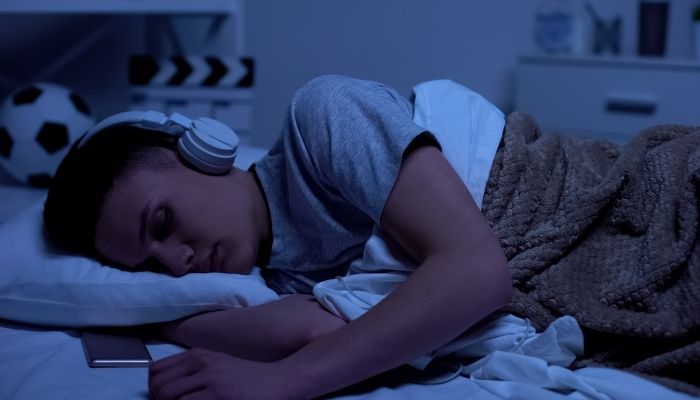
You might be wondering, can you sleep with over-the-ear headphones? The short answer is yes; the long answer depends on a couple of things.
To sleep comfortably with over-the-ear headphones, you’ll need a pillow that won’t make them shift or add harmful pressure to your ears. You can use a pillow with a hole in it, a really flat pillow, or a travel pillow. With a travel pillow, you can wear it around your neck like usual or put it under your head as you lay on your side so that the headphones fall in the crevice in the middle.
You can also try changing your sleep position by sleeping on your back. And don’t forget to look for headphones with flexible headband materials!
Low-Profile On-Ear Headphones
On-ear headphones, or ear-hook headphones, might be less prevalent in the daytime, but they are a winner for wearing them as you sleep. These headphones hang from your ears and place the flat speaker drivers over your ear, which is more comfortable for sleeping.
With thinner, low-profile on-ear headphones, you can increase your comfort and sleep in whichever position is most comfortable. And the better models will have flexible ear hooks that cushion the outer rim of your ears and come with noise-canceling properties.
Keep in mind that most of these have wires, so if you toss and turn a lot, these might not be right for you.
Adaptive Sleep Speakers
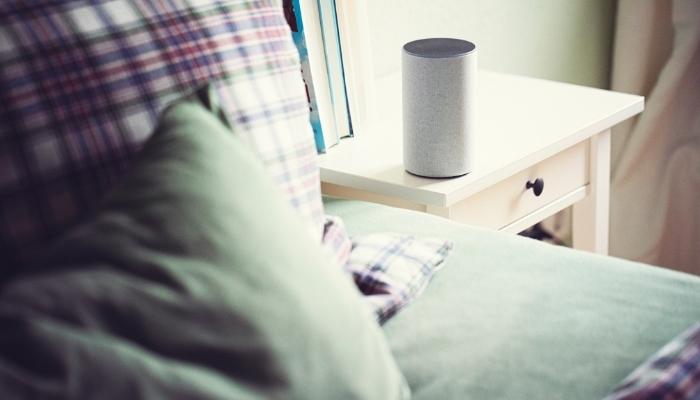
If you sleep alone or simply can’t get comfortable wearing headphones to sleep, you can try using adaptive sleep speakers to play sound. These work like white noise machines, but the adaptive technology automatically adjusts the volume according to the ambient noise in your room, minimizing disruptions while you sleep!
Some models come with multiple settings and realistic sounds like city noise or waterfalls, so you don’t have to use your phone’s Bluetooth at night. You’ll save your phone’s charge for your morning alarm! But if you don’t mind using your phone’s Bluetooth, you can always connect your music to a smart voice-assisted speaker and keep it by your bed.
Pro Tip: If you don’t like monodirectional sound, look for smart pillows with built-in speakers to play soothing music.
Find Your Sound

Who knew there were so many to use headphones as you sleep? And while sometimes the quality of sound may leave something to be desired on some models, the most significant benefit is what these sleep headphones can do for your sleep. But whether you’re looking to help your sleep or want better daytime headphones, Toton’s TV has you covered!
Have any questions? Give us a call or stop by, and our staff will help you find what you need.